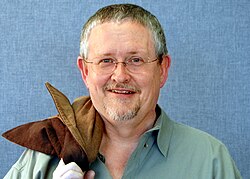Orson Scott Card Quote
Will we be extinguished? What difference does it make then, the ones of us who had plans, what does it matter the work we’ve done? The children we’ve raised? He looked pointedly at Olhado. What will it matter then, that you have such a big happy family, if you’re all erased in one instant by that … bomb? Not one moment of my life with my family has been wasted, said Olhado quietly. But the point of it is to go on, isn’t it? To connect with the future? That’s one part, yes, said Olhado. But part of the purpose of it is now, is the moment. And part of it is the web of connections. Links from soul to soul. If the purpose of life was just to continue into the future, then none of it would have meaning, because it would be all anticipation and preparation. There’s fruition, Grego. There’s the happiness we’ve already had. The happiness of each moment. The end of our lives, even if there’s no forward continuation, no progeny at all, the end of our lives doesn’t erase the beginning.
Will we be extinguished? What difference does it make then, the ones of us who had plans, what does it matter the work we’ve done? The children we’ve raised? He looked pointedly at Olhado. What will it matter then, that you have such a big happy family, if you’re all erased in one instant by that … bomb? Not one moment of my life with my family has been wasted, said Olhado quietly. But the point of it is to go on, isn’t it? To connect with the future? That’s one part, yes, said Olhado. But part of the purpose of it is now, is the moment. And part of it is the web of connections. Links from soul to soul. If the purpose of life was just to continue into the future, then none of it would have meaning, because it would be all anticipation and preparation. There’s fruition, Grego. There’s the happiness we’ve already had. The happiness of each moment. The end of our lives, even if there’s no forward continuation, no progeny at all, the end of our lives doesn’t erase the beginning.
Related Quotes
About Orson Scott Card
Card, who is a great-great-grandson of Brigham Young, was born in Richland, Washington, and grew up in Utah and California. While he was a student at Brigham Young University (BYU), his plays were performed on stage. He served in Brazil as a missionary for the Church of Jesus Christ of Latter-day Saints (LDS Church) and headed a community theater for two summers. Card had 27 short stories published between 1978 and 1979, and he won the John W. Campbell Award for best new writer in 1978. He earned a master's degree in English from the University of Utah in 1981 and wrote novels in science fiction, fantasy, nonfiction, and historical fiction genres starting in 1979. Card continued to write prolifically, and he has published over 50 novels and 45 short stories.
Card teaches English at Southern Virginia University; he has written two books on creative writing and serves as a judge in the Writers of the Future contest. He has taught many successful writers at his "literary boot camps".
